Author: dorner
Event: HathiTrust Research Center (HTRC) UnCamp
- Demystifying HathiTrust metadata
- Fair use, copyright, and non-consumptive research
- HathiTrust development, news, and updates
- Digital pedagogy and text analysis curricula
- Scholarly tools and methods for text analysis
- Corpus creation
- Early registration price of $100 through November 29, 2017.
- Standard price of $150 begins on November 30, 2017.
Primary Sources: Chinese Pamphlets: Political Communication & Mass Education
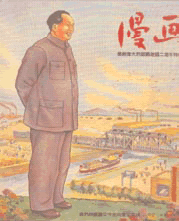 Another digitized collection from the Center for Research Libraries is Chinese Pamphlets: Political Communication & Mass Education, materials collected by the journalist Edward Hunter. The Hunter Collection consists of “mass education materials published in Hong Kong and in Mainland China, particularly Shanghai, in the years 1947-1954. These include approximately 200 cartoon books, pamphlets, postcards, and magazines, heavily pictorial in content, on such topics as foreign threats to Chinese security, Chinese relations with the Soviet Union, industrial and agricultural production, and marriage reform. The materials were produced by both Kuomintang (Chinese Nationalist) and Communist regimes, and appear to be directed at the general youth and adult populations of China.”1
Another digitized collection from the Center for Research Libraries is Chinese Pamphlets: Political Communication & Mass Education, materials collected by the journalist Edward Hunter. The Hunter Collection consists of “mass education materials published in Hong Kong and in Mainland China, particularly Shanghai, in the years 1947-1954. These include approximately 200 cartoon books, pamphlets, postcards, and magazines, heavily pictorial in content, on such topics as foreign threats to Chinese security, Chinese relations with the Soviet Union, industrial and agricultural production, and marriage reform. The materials were produced by both Kuomintang (Chinese Nationalist) and Communist regimes, and appear to be directed at the general youth and adult populations of China.”1
This collection can be searched or browsed. A few of the pamphlets include English translations.
1 “Chinese Pamphlet Digitization Project.” Accessed October 4, 2017. https://dds.crl.edu/view/about_hunter.
Event: Workshops for faculty and graduate students
Events: 2 Google Workshops (one of them is mine)
 Here are upcoming workshops on Google-related tools. Snacks and soft drinks will be provided.
Here are upcoming workshops on Google-related tools. Snacks and soft drinks will be provided.
Google Search Tips, Tricks and Hacks
October 3 | 4-5 p.m. | 405 Moffitt Library
Refresh your memory on a variety of tricks and strategies to make searching Google, Google Scholar, and all Google’s information products more productive. Taught by Jennifer Dorner and Jesse Silva. (RSVP here)
New Google Sites workshop: Organize, collaborate and share
October 5 | 4-5 p.m. | 405 Moffitt Library
October 16 | 3-4 p.m. | 405 Moffitt Library
Learn how to organize, collaborate, and share online content in the New Google Sites. Sites offers an intuitive drag & drop interface, responsive design, and pre-defined templates. Whether for school, work, play, family, or social, Sites is a simple way to design, manage, and publish a website, wiki, or portfolio, without any prior programing or design skills.Taught by Jen Bellenger and Rob Silva from the bConnected Team. (RSVP here)
Primary Sources: 6 magazine archives
 Instead of writing up each of these individually, I will follow up on the last post about the Life Magazine Archive with links to six magazine archives the Library has acquired in the last year.
Instead of writing up each of these individually, I will follow up on the last post about the Life Magazine Archive with links to six magazine archives the Library has acquired in the last year.
Time Magazine Archive
Subjects: American Studies, History
Years: 1923-2000
Architectural Digest Magazine Archive
Subjects: Architecture
Years: 1922-2011
BusinessWeek Magazine Archive
Alt names: Bloomberg BusinessWeek, Business Week
Subjects: Business
Years: 1929-2000
Forbes Magazine Archive
Subjects: Business
Years: 1917-2000
Fortune Magazine Archive
Subjects: Business
Years: 1930-2000
Life Magazine Archive
Subjects: American Studies, History, Journalism
Years: 1936-2000
These can all be searched or browsed by issue.
Primary Sources: Life Magazine Archive
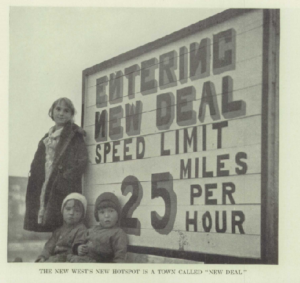 As described on its website, Life Magazine Archive “presents an extensive collection of the famed photojournalism magazine, spanning its very first issue in November, 1936 through December, 2000 in a comprehensive cover-to-cover format.
As described on its website, Life Magazine Archive “presents an extensive collection of the famed photojournalism magazine, spanning its very first issue in November, 1936 through December, 2000 in a comprehensive cover-to-cover format.
“Published by Time Inc., the magazine has featured story-telling through documentary photographs and informative captions.Each issue visually and powerfully depicted national and international events and topical stories, providing intimate views of real people and their real life situations.
“Articles and cover pages are fully indexed and advertisements are individually identified, ensuring researchers and readers can quickly and accurately locate the information they seek. Life Magazine Archive is valuable to researchers of 20th-Century current events, politics and culture, as well as those interested in the history of business, advertising, and popular culture.”
The covers, articles, and advertisements can all be searched. It is also possible to browse through an issue, once a page of the issue has been retrieved.
Trial: Newspapers and Associated Press collections
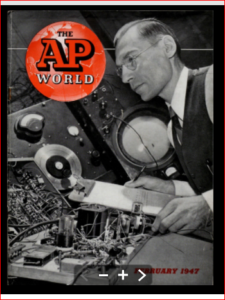 Until October 20, 2017, the Library has trial access to the following resources:
Until October 20, 2017, the Library has trial access to the following resources:
Associated Press Collections including,
Associated Press: European Bureaus Collection
Associated Press: Middle Eastern Bureaus Collection
Associated Press: News Features & Internal Communications
Associated Press: US City Bureaus Collection
Associated Press: Washington Bureau II Collection
Associated Press: Washington/D.C. Bureau Collection
Daily Mail Historical Archive
International Herald Tribune
The Telegraph Historical Archive, 1855-2000
Your feedback on the usefulness of these is greatly appreciated.
Primary Sources: KKK Newspapers
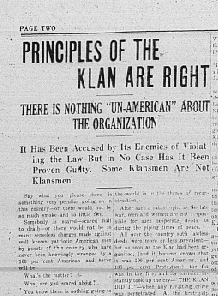 KKK Newspapers: Hate in America: The Rise and Fall of the Ku Klux Klan in the 1920s is a growing collection of digitized newspapers published by Ku Klux Klan organizations, publishers sympathetic to the KKK, and also some anti-Klan organizations. This resource was developed by Reveal Digital as part of their goal to “document a range of viewpoints that chronicle the historical record of 20th century America.” Their first project, Independent Voices, provides access to alternative press newspapers, magazines, and journals from the latter half of the 20th century.
KKK Newspapers: Hate in America: The Rise and Fall of the Ku Klux Klan in the 1920s is a growing collection of digitized newspapers published by Ku Klux Klan organizations, publishers sympathetic to the KKK, and also some anti-Klan organizations. This resource was developed by Reveal Digital as part of their goal to “document a range of viewpoints that chronicle the historical record of 20th century America.” Their first project, Independent Voices, provides access to alternative press newspapers, magazines, and journals from the latter half of the 20th century.
Access to the first 18 titles in the collection is available to funding libraries, including the UC Berkeley Library. When the project is complete, it will be available to everyone.
The KKK newspapers project was recently featured in Slate, in a feature titled “Guess Whether These Headlines Came from Breitbart or 1920s KKK Newspapers.”
Trial: Arte Publico Hispanic Historical Collection
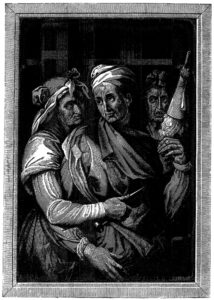 The Library has a trial of EBSCOhost’s Arte Público Hispanic Historical Collection series 1 and 2, lasting through February 28, 2018.
The Library has a trial of EBSCOhost’s Arte Público Hispanic Historical Collection series 1 and 2, lasting through February 28, 2018.
The Series 1 database includes articles and historical books about 17th to 20th century Latino-Hispanic history, literature, and culture, as well as primary sources such as pamphlets and broadsides. 80% of the materials are in Spanish, but are fully indexed in both Spanish and English. Click here to explore the collection, which includes handwritten as well as printed resources.
The Series 2 focuses in more detail on Hispanic civil rights, religious movements, and Latina authors over the past 100 years in North America. Coverage includes 100 digitized newspapers, 300 manuscript collections/papers, and rare books, again indexed in both English and Spanish. Click here to explore this collection,
The collections include full-text which can be searched, page through, and downloaded as a PDF.
Please contact me at dorner@berkeley.edu with your feedback.
Trial: Colonial America, with handwritten text recognition
Adam Matthew Digital (AMD) has completed three of five modules of Colonial America, an online resource that will include all 1,450 volumes of the CO 5 series from The National Archives, UK, covering the period 1606 to 1822. The Library currently has trial access to the three modules until October 16, 2017.
It is with the third module of Colonial America that AMD has implemented a technology that allows for full text searching of handwritten documents. The Handwritten Text Recognition (HTR) application uses algorithms and artificial intelligence to determine possible combinations of characters in manuscripts.
The default search will search both metadata applied to documents and their text. When results are found in the text, they are displayed as snippets.
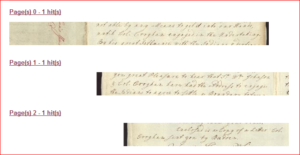
Clicking on a hit will take you to the page where the word appears.
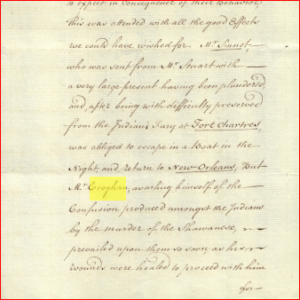
This search function is ground-breaking, but not 100% accurate. I’ve searched for words that exist in a document and have retrieved no results. I have also searched for words that were written sloppily or with a long s and have retrieved results.
I am interested in your feedback on both the value of the database and your successes (or failures) with full-text searches. Email me at dorner@berkeley.edu.
(Please note that PDF downloads are not available during the trial.)